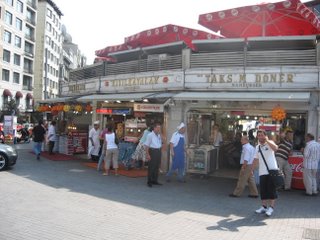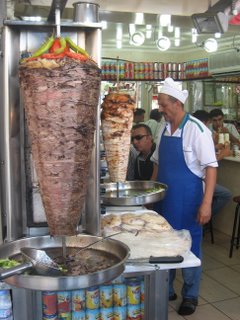 Typically, the cheapest is a "durum" for 75 cents... wrapped in a flat "durum" bread.
Typically, the cheapest is a "durum" for 75 cents... wrapped in a flat "durum" bread.
Other variations are döner wrapped in thick lavash flat bread, döner served in a pide loaf, the ever popular "yarim ekmek" served in a half loaf of french bread, or a "porsiyon" i.e. "potion" served on a late with salad, bulgur pilaf, and bread.

An amazing amount of döner kebab gets sold here throughout the day to commuters, party goers, and anybody who needs a quick meat pick me up. my son, Aron loves döner kebab in Budapest, but it isn't anything like the original. If I can sneak it on the plane home, I'll bring you one, Aron... just joking.

The word döner comes from the Turkish verb "to revolve, turn" - hence the Greek version known as a "Gyro." In the late 19th century a kebab chef in Bursa named Mehmet Işkender developed a new kebab grilling technique by standing a charcoal grill on it's side, and suspending slices of meat vertically on a skewer. Thus, the döner was born. Nowadays "Işkender kebap" tends to refer to döner meat sliced thick and served on a pide bread covered in a tomato and yoghurt sauce. The Işkender family maintains a chain of "Original Işkender kebap" joints around Turkey, each graced with a portrait of the founder:

No comments:
Post a Comment